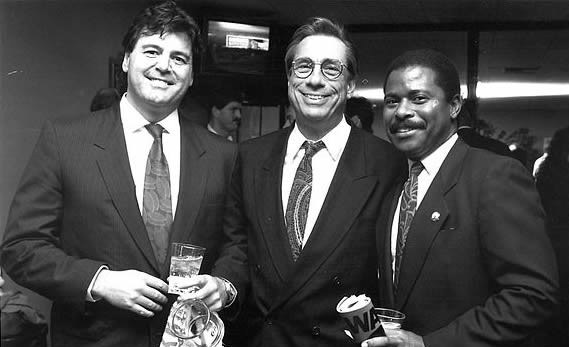Over the weekend a tape of Donald Sterling making racist statements was released. Sterling owns the L.A. Clippers basketball franchise. By Tuesday, Sterling was banned from all association with the NBA, fined $2.5 million, and the league’s commissioner had vowed to hold a vote to strip Sterling of his franchise.
Pretty much everyone seems happy about this, as they should. There has been some backlash by people claiming Sterling’s First Amendment rights are being violated. Let’s clear one thing up right now: the First Amendment protects you from censorship by the government. If I punch you in the face because you said something I don’t like, that’s assault, but not a constitutional violation. If I’m a policeman, then it might be a different story. The NBA is a collective body with a set of rules and procedures. It has determined Sterling broke those rules, and is taking steps to punish him. The courts will ultimately decide if the NBA actions will stand, but this has nothing to do with the constitution.There is a larger ethical debate going on about how our private conversations, which are no longer really private, should be used by those in power. Mike Pesca, writing in Slate, says:
But the process does raise some troubling issues. A private citizen whose private thoughts were audio-taped (perhaps illegally) has been told he can no longer own his private property because of the thoughts that were revealed on that tape. These thoughts were loathsome to be sure, but didn’t advocate anything illegal and didn’t call for any violent or even literally hurtful actions.
This is an argument worth considering. In an era when so much of our lives are public (sometimes by choice and sometimes not by choice), we’re going to have to learn to give people the benefit of the doubt. A bulgy underwear tweet forced Anthony Weiner from his congressional seat, but didn’t disqualify him from running for mayor of New York (that took more sexting under the name “Carlos Danger”). Teachers have been fired, or not fired, for racy photos. While every case is unique, there will need to be some guidelines our society follows – and there’s a good argument to be made that those guidelines should be looser than they are. Otherwise every current twenty-something with a Facebook page will never hold elected office.
But the Sterling case is exceptional, and there’s little reason for Sterling’s punishment to give us pause. First, Sterling, who made his fortune in real estate, has a history of discrimination in his business practices – including a $2.7 million settlement with the Justice Department in 2009. This is not football wide receiver Riley Cooper drunkenly saying the n-word on tape, as disgusting as that was. I think Sterling should receive more scrutiny as an owner and businessman, and someone who makes decisions that affect people’s lives – decisions that have a pattern of being racist.
Second, we’re talking about an extremely rich man being stripped of his professional sports franchise, not a middle-class worker losing her job. In an abstract moral universe, it would best to apply the same standards of judgment to every person and every situation, and not let hype or disgust bias our judgment. But this is not practical. And given that there’s no right to own an NBA team, an NBA team is an extremely unique piece of property, and Sterling is not in danger of losing his livelihood, I’m fine with applying a capricious standard in this case.
As commentators have noted, the more troubling issue is how Sterling was allowed to own the team for this long, given his past acts of discrimination. Clearly, the presence of the tape, and the public outrage it created, caused the NBA to take the steps it did. With a majority of NBA players and fans being non-white, this is a decision the NBA had to make. But owners of NBA teams, like all professional sports teams, are mostly coddled white men. FiveThirtyEight noted that 76% of players in the NBA are African American, but only 2% of majority owners. Only 18% of league staff are black, and it’s hard not to think that a more diverse staff would be attuned to these issues. Sterling’s plantation mindset – which he expressed on tape by saying he made the league and the players be giving them foods, cars, clothes, and houses – is probably not unique among owners.
So if you feel a little off about the swift punishment that came down on Donald Sterling, that’s o.k., it’s just your inner sense of fairness and legality. That being said, get over it. There’s much worse harms being done to much better people. For an example, read Sarah Stillman’s amazing New Yorker piece about civil forfeiture – basically cops blackmailing citizens over minor violations, and using that blackmail to seize their property as a way of funding their departments. Direct some of that anger and sympathy toward some people who could really use it.
